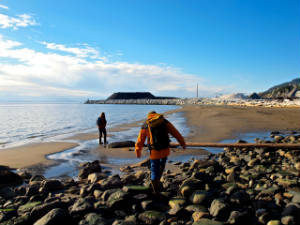
[Updated 28 October 2014]
Our Environmental Dispute Resolution Fund is a key tool available to British Columbians who are struggling with an environmental dispute. Grants from the fund helps people hire lawyers at a legal aid rate to help them resolve environmental problems – whether through negotiation, tribunals or the courts.

five six EDRF files will be in courts in 3 cities, addressing disputes involving 5 different communities. We’ve written about most of these court challenges on these pages over the past year or so.
West Coast supporters who are in Vancouver, Victoria or Nelson might consider sitting in on one or more of these court hearings to show your support and to learn a bit about environmental law. Court hearings of this type generally start at 10am and go until 4pm.
October
October 27-29 – in Vancouver – Voters Taking Action on Climate Change is challenging the BC government’s approval of a dramatically expanded coal port facility on Texada  Island. I’m excited about this one, since, as we’ve discussed previously, the case is based in part on our advice that coal ports should be regulated by the Ministry of Environment under the Environmental Management Act, and not by the Ministry of Energy and Mines under the Mines Act.
Island. I’m excited about this one, since, as we’ve discussed previously, the case is based in part on our advice that coal ports should be regulated by the Ministry of Environment under the Environmental Management Act, and not by the Ministry of Energy and Mines under the Mines Act.
The Environmental Management Act (EMA) and its regulations currently requires that any person who is engaged in “product storage” of “bulk solids” have a permit.... “Production storage – bulk solids” is defined as including “… activities and operations for the storage or handling of… coal …”
So when VTACC and residents from Texada and Lasqueti Islands approached us last year, we told them that an EMA permit is required – and, indeed, should have been required even for the smaller coal pile currently operated by Lafarge Canada.
Oct 30 (and possibly half of the 31st) – in Victoria - Lynda Gagné and Charles Claus, residents of Terrace, have been denied the right to appeal a permit allowing Rio Tinto Alcan to increase its sulphur dioxide emissions at its Kitimat aluminum smelter to 42 tonnes per day, up from an earlier limit of 27 tonnes per day. They are challenging that decision in the BC Supreme Court. Gagné has said:
We are facing increased sulphur dioxide in our air, our lungs, our forests, our water, our gardens, our local farms, and our food. It is nonsensical for Alcan and the EAB to say we don’t have standing to challenge the appeal, especially after the company included Terrace residents in its community consultations over the emissions increase.
November
Nov 3 – in Vancouver – The Nicola Valley Fish & Game Club has found itself embroiled in a massive court battle involving the province and a private resort over whether fish, lakes and highways are always owned by public or whether they can be privatized by a private resort. As we’ve written previously, it’s a case with huge implications, and we’re proud to have supported the Club to date – but the size of this litigation is beyond our capacity as a fund. Consequently, the Club’s lawyers will be making an application on November 3rd for “advanced costs”. Essentially the club is asking the court to order the government and/or the resort owner to pay for the costs of its lawyers fees in the hearing. It’s an exceptional order, which the Canadian courts will only grant in issues of great public importance, but we are hopeful that the Club’s case qualifies.
[November 26-27 - in Vancouver - The Society for the Vancouver Airport Fuel Project Opposition for Richmond (VAPOR) will be in court arguing that the environmental assessment of of the Vancouver Airport Fuel Project did not meet the requirements of the Environmental Assessment Act, and should be overturned.]
Nov 27 – in Nelson – November 27th is a tentative date for hearing related to the private charges under the Fisheries Act that have been laid by Slocan Resident, Marilyn Burgoon, against Executive Flight Services and the Province of BC in relation to the Lemon Creek jet fuel spill. If the hearing goes ahead on that date, Burgoon’s lawyer, Lilina Lysenko, will attempt to convince a judge that EFS and the BC government need to appear in court to answer the charges.
December
Dec 8 – in Nelson – The West Kootenay EcoSociety is challenging the BC government’s creation of the Jumbo Resort Municipality – a municipality with no residents. As we wrote in March 2013 (justice can be slow):
The reason for this so-called “municipality” is to allow the controversial Jumbo Glacier Resort to go ahead. The Jumbo Glacier Resort is expected to negatively impact Grizzly habitat, and is widely opposed in the Kootenays (where the resort will be located). But in May 2012, the government amended the Local Government Act to allow the creation of ski-resort related municipalities with no people and then, last November, created the Jumbo Mountain Resort Municipality.
A municipality without people? Can they do that? That’s the key question in a legal challenge being brought against the Resort Municipality by the Nelson-based West Kootenay EcoSociety with funding from West Coast.
[December 15th-22nd] - in Victoria - A seventh case - Stannus and Toews v. BC - is scheduled to be heard not by a court, but by BC's Environmental Appeal Board. This appeal is the sister case of the Linda Gagné challenge discussed above - as Stannus and Toews are appealing the same expansion of the Rio Tinto smelter that Gagné would like to challenge.]
In each of these cases the judges are likely to take time to think about the case and write their decision, so don’t expect to witness a victory (or loss) if you do go to sit in on any of these hearings. And definitely don’t expect to see this number of court cases funded by the EDRF all being heard within a 2 month period any time again – this is a fluke.
But we will be watching all of these cases closely, and we hope to be able to report on some significant environmental wins in the next several months.
By Andrew Gage, Staff Counsel